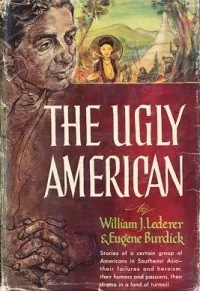
In the depths of the Cold War, the USSR in 1957 launched Sputnik, the first satellite to orbit the earth. This had a profound effects on American society, as it both frightened Americans and undermined the notion of American exceptionalsim.
The very next year saw the publication of The Ugly American, the bestselling novel which excoriated American diplomats for their failure to understand Southeast Asian customs and language, in marked contrast to the Soviets, who were able to communicate effectively with the locals and thereby win influence. These two rather disparate events not only led to a dramatic turn towards the hard sciences in school, but also in a revamping of the Foreign Service Institute’s language programs.
Howard E Sollenberger served as a Chinese language professor and the executive officer of the language school in the 1950s. He would later become the Director of FSI in 1971. He discusses how FSI and Deputy Under Secretary of State for Administration Loy Henderson helped bring about the much needed change in language training for U.S. diplomats, including language facilities at posts abroad, improved materials, and the creation of a comprehensive system to evaluate a student’s reading and speaking ability in a foreign language, which was widely adopted by other government agencies and colleges and is still in use today. Sollenberger was interviewed by Charles Stuart Kennedy beginning in December 1997.
Read Sollenberger’s account of what FSI had to endure during McCarthyism in The Red Scare Hits the Foreign Service Institute. Learn about the bureaucratic battle to move FSI to its present location.
“It purported that the Americans were way behind the Soviets in terms of their relationships with people in foreign countries”

SOLLENBERGER: Sputnik was the Russian satellite, the first satellite that was put up to orbit the earth. This, in fact, caused a big stir in the United States. Suddenly it appeared as though the Soviets were ten feet tall. They had jumped ahead of us on getting a satellite in orbit, so we began to look at all the other things that were coming out.
There was a book out then by the title of The Ugly American. That suddenly attracted a lot of attention because it purported that the Americans were way behind the Soviets in terms of their relationships with people in foreign countries, language, understanding the cultures, etc.
It affected the way in which the Congress began to look at training, as well as the Department of State, and taking advantage of that situation that [Deputy Under Secretary of State for Administration from 1955 until 1960] Loy Henderson and others in the Department, decided to move and to move aggressively on the issue of training.
Generally, the language program came out pretty well on that because that was really about the only part of the Institute that was functioning. The junior officer training program was going on and it was a continuing sort of thing. That came under attack, the way in which that was handled. Of course, the whole recruitment system came under attack by the Wriston Committee [which called for wholesale reform of the State Department, including the integration of the Foreign Service and the home (civil) service “where their functions and responsibilities converge”]..
But there was generally a good deal of interest on the language aspect of the training program. This, again, may have been because Wriston was the chairman, was interested, and had an acquaintance with Dr.[Walter Bedell] Smith [Under Secretary of State]. And the fact that we seemed to be producing something.
The fact that Loy Henderson was there [at the Wriston Committee], and heard all of the discussion on the training program, and had gotten acquainted really with the staff of the Institute at the same time, really…led later to the expansion of the language training, and establishment of the field schools in Spanish, French and German overseas. He began to take a keen interest in language training.
And the interesting part of that was that he felt that he had been denied an opportunity when he should have had it as a young officer, and he wanted to see that others had the opportunity to get that. That was one of the benefits that came from this committee meeting, and the fact that Loy Henderson himself came to all of the advisory committee meetings on the Institute on training.
“We found there was really a very big gap between competence in the language and assignments in the field”
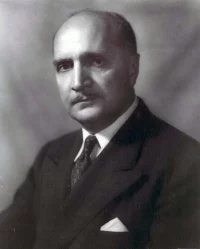
I remember Loy (pictured) asking me at one point whether we knew what skills we had in the Foreign Service at posts. Do we know at posts who can speak French in France, etc., and around the world?
I said, “No, I don’t think we do, that’s a question for Personnel.” We said if you would draw him up a message to be sent out worldwide to get information on this, we’ll do it. I said, you have to understand also that this will be self-appraisal, people saying what they think their own competence is.
He said, “That’s a good place to start.”
We went out with that and found there was really a very big gap between competence in the language and assignments in the field. What can we do about it? Well, there are a lot of logistic problems if we wait for people to come back to Washington to train them to go out. It’s going to take a long time.
He said, “Let’s not wait.”
I said, “The alternative is to set up facilities either at posts or central schools overseas in a crash program that would pull people in who do not have the language proficiency in the country and train them. The place to start is in the world languages where the demand is the greatest.”
Loy Henderson said, “Do it.”
So we proceeded, and I think it was 1957 that on a crash basis set up schools, one in Nice, one in Frankfurt, one in Mexico City to deal with the so-called world language shortage to train people.
Personnel was horrified. The idea of pulling people away from their posts when the posts were screaming for more staff, and sending them off to school. They had hoped it would be a matter of just a couple weeks. It’s not going to work that way. If you’re serious about it, it should be four months, if you want to get them really up to snuff, three months at the minimum, and if you have a three-month period, you ought to build up the follow-up at the posts so they can continue their training when they get back because probably most of them would start off from scratch and are not going to get to the 3 level [basic proficiency, on a scale where a 5 is completely bilingual] in three months.
You have a better chance of doing that in the field, than doing it back here. We knew there would be opposition, particularly from Mr. Rooney [Congressman John Rooney of New York]. As it turned out there was.
Loy Henderson was willing to accept that and to go ahead with it. He had enough clout in the Department to make it stick through the Personnel system, and we pulled people in to all three of these schools for three months, 12 weeks of very intensive training. I was involved in going out and deciding where the schools should be located, and setting them up.
I did not like the idea of setting up a school in Nice. I knew that would attract a lot of negative comment, particularly from Congressman Rooney, but there were reasons why they thought Nice was the place to do it. We had a large building there and so rent would be free, a very nice estate to locate and that would accommodate the training program.
That worked, and in a very short period of time we put a large number of people through this program, and sent back to the French, German, Spanish speaking posts. This was really a sort of unprecedented focus.
The German training was in Frankfurt, and the Spanish in Mexico City. Interesting, I fought Mexico City, but I was overruled. I wanted to have it set up outside the large metropolitan area — there were too many distractions within the city. I had located a school in the countryside that was not in use that we could rent.
There were accommodations, they were not luxurious accommodations, but they were livable. Review of the plan to set it up there was turned down on the basis it would be hard to get people to go to a place like that, even for three months. So it was put in Mexico City, which we did. It worked reasonably well.
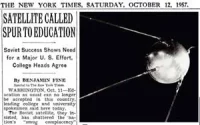
This was also a time when, under the National Defense Education Act, Title IV [passed in 1958, its purpose was to provide funding for U.S. education institutions at all levels in the wake of Sputnik], the government was required to identify language needs and language skills. And as a result of that we had to develop a testing system.
It was also obvious that we needed standards in testing if we were going to try to get people up to a level that was considered important so far as their function in the Foreign Service. That system got underway.
As part of the buildup we also put regional language supervisors in the field, and this was not only in the world language areas, but elsewhere also, in the Middle East and in Asia. But in Asia it was primarily done through the field schools that we had then in Taipei, Taiwan, and in Tokyo. The people who’d been assisted with the post language training program — in other words a follow-up on the training that would be given in the United States. Enrollments in the post language training program… increased from about 600 in 1953 to 4500 by 1960, a tremendous jump.
“Sputnik and The Ugly American really led to the establishment of the National Defense Education Act”
In addition to that the Congress began to move and in an amendment to the Foreign Service Act — the amendment came in 1960 — the Congress stated that it…”was the policy of the Congress that chiefs of mission and Foreign Service officers shall have to the maximum practical extent among their qualifications a useful knowledge of the principal language, or dialect, of the country in which they are to serve, and knowledge and understanding of history, the culture, the economics, political institutions, and interests of such country and its people.” A very broad and sort of mandate statement of principle and policy.
That was followed by another Senate policy which required the Department to designate language as central positions, and the level of language proficiency that was required, and to report annually to the Congress on its compliance.
[Senator J William] Fulbright and [Senator Mike] Mansfield were probably the principal people that were pushing this. Both of these people had called me up to the Senate to talk about what they wanted to do, and what the problems really were in the Foreign Service. I remember a couple of these sessions that I had with them and it was clear that they were serious….
The advantage at that particular point was that we had Loy Henderson’s support. And the other positive thing was that we had a director, a business man, who was able to get the budget up and he faced a lot of problems with Congressman Rooney to the point where Mr. Rooney at one point on the floor of the House of Representatives called on the floor to have him fired.
Q: Was there any way to co-opt Rooney? We had Rooney (pictured) handlers who used to take him around on trips. He liked to go to Rome and Paris and people sat with him and fed him a lot of liquor. Were you able to get anybody to sort of get to him to make him understand what was going on?
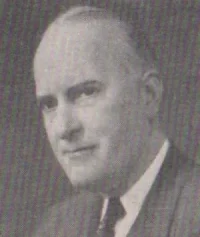
SOLLENBERGER: I think it was a fun thing for him. Plus he had a constituent that he’d hoped to get some business for, Berlitz. He was probably responsible for, I think, closing down our language schools. But they had pretty well done the emergency crisis job. He made a visit to Nice, a place he liked to go to. So under his pressure the school there folded.
But the advantage that I had in trying to move ahead in organizing this program on an emergency crash basis was the support first of Loy Henderson, not the support…but really the push from Fulbright and Mansfield in the Senate, and the way in which they were able to in a way force the Department to do what it didn’t want to do but reluctantly they did. And getting the budget for this.
The result really of the Congressional policy statement was that language became much more important, not only the world languages, but the so-called hard languages. This put a real burden on the Institute because materials for advance training in many of these languages did not exist, or were quite unsatisfactory. And it required a major effort within the Institute for research and development of teaching materials, as well as teaching methods. Trying to not only keep up but to get ahead in the field. We had to recruit, and at that particular time it was not easy to persuade people from the academic community to come and work for the State Department.
Part of the reluctance was because McCarthy’s attack on the State Department, and the academics did not want to subject themselves to that sort of a situation. I was lucky because about the same time that we had to start expanding, the Army Language School in Monterey was contracting and was becoming less academic in its focus, not as experimental as they had been.
The dean and two of his senior linguists wanted to leave, so I recruited them and brought them to the State Department. I made the dean my deputy, and the other two moved in to a hard language field where we had had shortage. We had really a top notch staff. If you looked anywhere in the country in academia we could match them and stand tall with the quality of linguists that we had at that particular time….
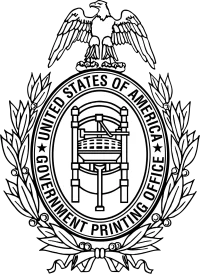
By 1965, the Institute had published through the Government Printing Office [GPO] materials in 30 different languages, and most of these had tapes to go with them, and we worked out arrangements with the GPO whereby these could be sold to the public.
So this began to have an effect in terms of the academic community where they were able to get the materials that were produced at an advanced level. And it began to change some of the instruction patterns in a few of the academic centers, not many but in a few. But it was sort of a wedge, if you will, of influence in the language teaching and in the academic world.
At the same time the testing system, the S/R testing scale, the proficiency testing scale, became of more interest in the academic community. They would send people to the Institute to observe the testing procedures. We on several occasions sent teams of people out to several of the academic institutions, particularly when they were having workshops in dealing with language proficiency, because there was increased pressure on the academic world to begin to produce people who could practically use the language in everyday situations….
It became pretty clear that if you had the language requirement before coming in, you’d be getting people who had been primarily majors in foreign languages, and the Department felt, and I think rightly so, that they couldn’t put that much emphasis on a pre-service requirement, particularly when you could do it after they got into the service.
So while there were tests that were given, and records were kept of the language aptitude, as well as the language proficiency, the plan really was that they would get the language of their first post of assignment, and they would be required to get to a certain level. I think it was S-2 [speaking level 2, minimal proficiency] to get off the probation.
Sputnik and The Ugly American, probably these two things that really led to the establishment of the National Defense Education Act. And putting in the National Defense Education Act Title IV on language and area studies.
Of course, this dealt primarily with American education, but also with the needs of the government. There was a committee set up… that had representatives of different agencies. I eventually ended up in that group, and met with them representing the Institute.
Measuring language proficiency

It became very clear that before they could do anything they would have to have a system for measuring language proficiency. They turned to the Institute as the place where the linguists were. A group of professionals said, “Come up with something that we can use.”
So we sat down, and we worked at it. We developed a language area system for evaluating proficiency, or skill, or background knowledge. It was based on a practical utilization scale which later became the S/R scale [speaking and reading] that’s still used.
We experimented with different ways of developing the scale. We brought in some outside expertise, psychometricians who were dealing with matters of this sort. [Note: Psychometrics refers to the measurement of an individual’s psychological attributes, including the knowledge, skills, and abilities a professional might need to work in a particular job or profession.] We were in touch with Princeton to get their view.
We developed first of all a scale, and a form, that could be used for self-appraisal, and we distributed this on a trial basis within the Department of State, to people who had agreed in advance in doing this. They would subject themselves to a test so we could see how the self-evaluation matched up with the test that they were given. And the test was to have been an oral interview, not structured at that particular point.
It was really not very standardized, or calibrated properly at that early stage. But we also had a questionnaire on area. That was harder to develop, but we did, and after we tested it out in the Department of State, we decided to send it overseas on a self-appraisal basis, on a volunteer basis, and we got quite a few returns from that. And that gave us a base from which to compare later on how tests, as they came back for tests, how this compared with the way in which they had rated themselves.
We found a fairly high correlation between self-appraisal, but we were a little suspicious of that because they knew they were going to be tested. So the tendency, if you knew you were going to be tested, is to lower your self appraisal.
But we also had some records from people who had claimed on their applications to the Foreign Service their language skills, and testing them they did not know they were going to be tested after that. We got a little better view on that and decided we couldn’t go on a self-appraisal basis, particularly if assignments were going to be based on language skills, and if there was a possibility of promotion being based on language skills, you had to be able to defend within reason the scales that you use. We worked very hard on this.
The same information was sent out by the government committee to universities where it sort of disappeared at that time. It was only some years later that they began to become interested in the system that the government was using because it had spread from the Institute to others; the Army was beginning to use it, CIA was using it, USIA [U.S. Information Agency] was basing its program and policies, and AID [U.S. Agency for International Development] was doing the same thing.
So people coming into the foreign affairs agencies were generally being appraised on the S/R scale that the Institute had developed. The academic community began to become interested in it, and as some of the linguists went back into the academic community, they took this back with them. It’s one of the things that I think the Institute has done that has had a significant impact on language training in the country.
